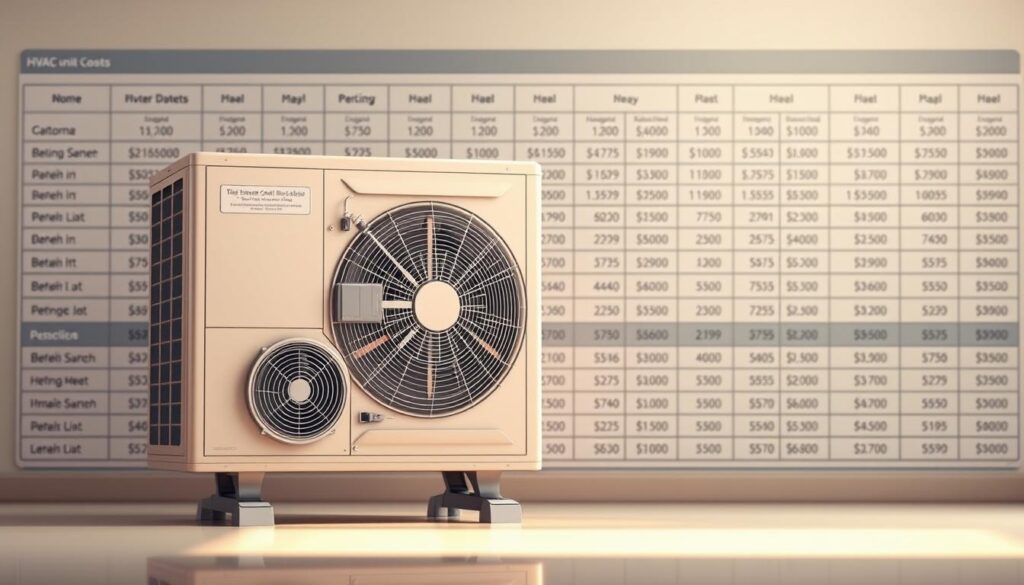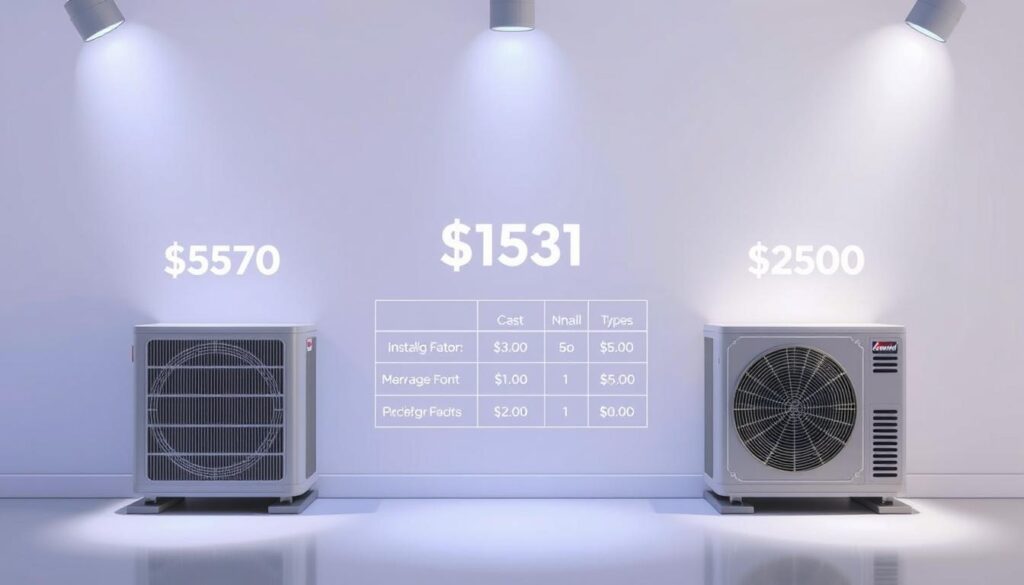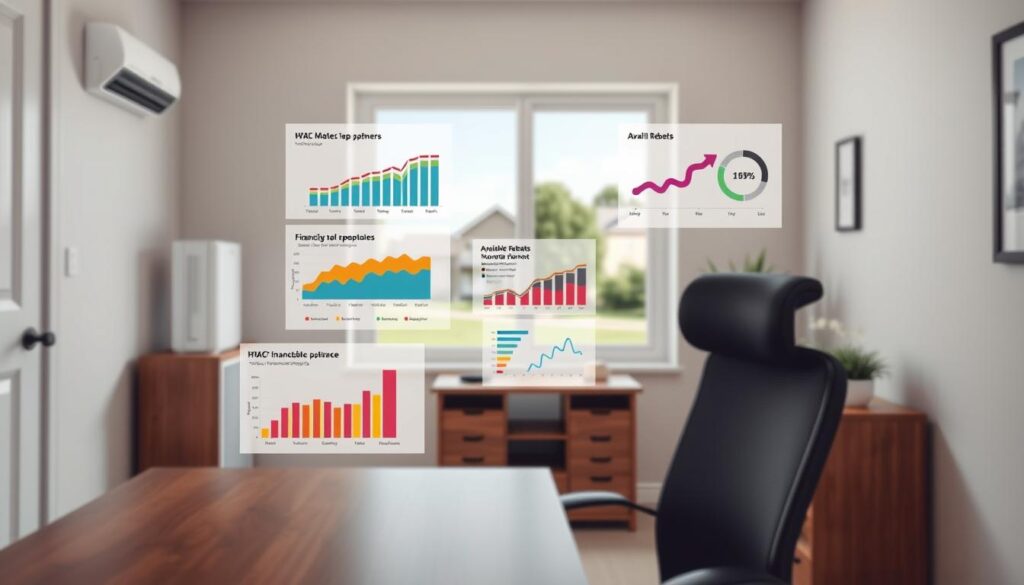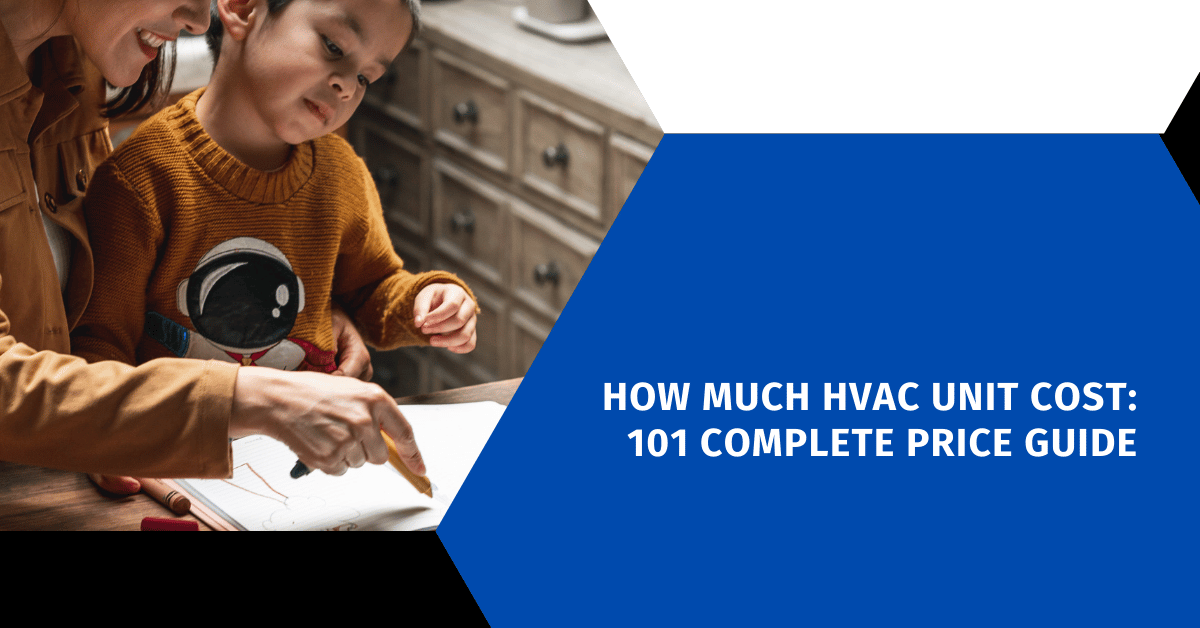Affiliate Disclosure
HVAC Guide Guys is a participant in the Amazon Services LLC Associates Program, an affiliate advertising program designed to provide a means for sites to earn advertising fees by advertising and linking to Amazon.
How Much HVAC Unit Cost? Are you tired of sweating in the summer and freezing in the winter? An outdated heating and cooling system can make your home uncomfortable. Knowing the cost of an HVAC unit is the first step to a cozy home without spending too much.

Choosing the right HVAC system can be overwhelming. Homeowners face many options and must consider their budget. Your home’s comfort depends on making the right choice for your heating, ventilation, and air conditioning system.
In 2024, homeowners might spend between $3,500 and $6,000 on a new high-efficiency central air conditioning system. Prices change based on several factors. These include the system type, your home’s size, and local installation needs.
Key Takeaways
- HVAC unit costs range from $2,500 to $10,000
- Central air conditioning systems average $3,500-$6,000
- Installation prices vary by system complexity
- Energy efficiency impacts long-term costs
- Professional assessment is key for accurate pricing
Table of Contents
Understanding HVAC System Basics
HVAC systems are key for keeping indoor spaces comfy in homes and businesses. They do more than just control temperature. They also improve air quality, save energy, and boost comfort. Knowing how HVAC systems work helps you understand costs for both homes and businesses.
Today’s HVAC systems vary to fit different needs. Each type has its own perks and things to think about for your space:
- Split Systems: Common in homes, with indoor and outdoor units
- Packaged Systems: Great for small spaces or businesses
- Ductless Mini-Split Systems: Good for homes without ducts
- Geothermal Systems: Use the earth’s heat for energy
Core Components of HVAC Systems
An HVAC system has several main parts. They work together to control temperature and air quality:
- Heating Unit (furnace or heat pump)
- Cooling Unit (air conditioner)
- Ventilation System (ductwork and air handlers)
- Thermostat (control center)
- Air Filtration System
Importance of Proper System Sizing
Choosing the right HVAC system size is very important. A system that’s too small can’t keep your space comfy. On the other hand, a system that’s too big wastes energy and costs more. Experts use special calculations to find the perfect size for your space.
Proper sizing can cut energy use by up to 30% and make your HVAC last longer.
Average HVAC Unit Price Ranges in 2024
Knowing the cost of replacing your AC can help you plan your budget. In 2024, prices vary based on several important factors.
Installing a central air conditioning system usually costs between $3,500 and $6,000. Your exact price will depend on a few key things:
- Home square footage
- System efficiency rating
- Local climate conditions
- Equipment brand and quality
Different HVAC systems have their own price ranges:
- Central Air Conditioning: $4,000 – $6,500
- Heat Pumps: $4,500 – $7,500
- Ductless Mini-Split Systems: $2,000 – $5,000
When looking at heating and cooling prices, remember the long-term benefits. High-efficiency units might cost more at first. But they can save you a lot on energy bills over time.
Pro Tip: Always get multiple quotes and consider energy efficiency ratings when calculating your total ac unit replacement cost.
Your final price will also depend on local installation costs, your home’s complexity, and the system you choose.
Explore Our HVAC Shop
Looking for top-rated HVAC tools, parts, and accessories? Visit our shop and find the perfect solution for your needs.
Visit the ShopHow Much HVAC Unit Cost: Breaking Down the Expenses
Getting an HVAC system is more than just buying the equipment. Your total cost includes many parts that add up. Let’s look at the breakdown of hvac equipment costs and contractor rates.
When you plan to install an HVAC system, you’ll face several key costs. These costs affect your total investment:
- Equipment purchase
- Professional installation
- Additional materials
- Labor charges
- Permit and inspection fees
Equipment Costs vs Installation Fees
The cost of the HVAC unit varies from $1,300 to $5,500. This depends on what you need. Installation costs add $750 to $1,500. These prices change based on how complex the system is and the local market.
Additional Materials and Labor Charges
You’ll also need to budget for extra materials like:
- Ductwork modifications
- Refrigerant lines
- Electrical connections
- Mounting hardware
Labor costs are a big part of the total. Technicians charge $75 to $250 an hour. This can add $500 to $2,500 to your costs.
Permit and Inspection Costs
Local laws need permits for HVAC installations. These costs are $250 to $800, based on where you live. Inspections make sure your system is safe and efficient.
Pro tip: Always request detailed quotes from multiple HVAC contractors to compare costs and services.
Factors Affecting HVAC System Pricing
Knowing what affects hvac installation prices helps you choose the right HVAC system for your home. Many factors influence the cost of your heating and cooling system.
The size and power of your HVAC unit are key in pricing. Bigger homes need stronger systems, which raises the cost. Energy-saving HVACs cost more upfront but save money on bills over time.
- System Size and Capacity: Determines base pricing
- Energy Efficiency Ratings (SEER2): Higher ratings increase initial cost
- Brand Reputation: Premium manufacturers charge more
- Installation Complexity: Difficult installations raise labor costs
Your local climate also affects HVAC prices. Places with very hot or cold temperatures need stronger systems. This increases both the equipment and installation costs.
Homes needing ductwork changes or special designs will cost more for HVAC installation.
Extra features like smart thermostats, advanced air filters, and zoning systems improve comfort. But, they also increase the cost of your HVAC system.
Pro Tip: Always get multiple quotes and consider long-term energy savings when evaluating HVAC system prices.
Understanding these factors helps you plan your HVAC budget better. You can choose energy-efficient options that offer great value for your needs.
Energy Efficiency and Long-term Cost Savings
Choosing energy-efficient HVAC options can cut your heating and cooling costs over time. Knowing how efficiency affects your budget helps you make better choices for your home’s comfort and savings.
Today’s HVAC systems offer big savings through new energy-saving tech. When picking your heating and cooling, think about these important efficiency points:
- Seasonal Energy Efficiency Ratio (SEER) ratings
- Annual operating cost projections
- Potential return on investment
- Energy Star certification
SEER Ratings Explained
SEER ratings show how well an HVAC system cools. Higher ratings mean better efficiency and lower energy use. A system with a SEER of 16 or more is very efficient, saving you a lot on bills.
Annual Operating Costs
Compare different energy-efficient HVAC systems to see your savings. A pricier system with a high SEER rating could save you hundreds a year. Your initial cost could be back in savings in a few years.
Return on Investment Calculations
When looking at heating and cooling prices, don’t just focus on the cost. An efficient system might cost more upfront but saves money long-term. It uses less energy and needs less maintenance.
Smart homeowners invest in efficiency, not just initial price.
Explore Our HVAC Shop
Looking for top-rated HVAC tools, parts, and accessories? Visit our shop and find the perfect solution for your needs.
Visit the ShopInstallation Costs by System Type

When looking at residential HVAC systems, knowing the installation costs is key. Each system has its own needs, affecting your total cost.
The cost to install an HVAC system varies a lot. Let’s look at the main types and what you might pay:
- Central Air Conditioning Systems
- Need a lot of ductwork
- Costs usually range from $3,500 to $7,500
- Installation is the most complex
- Heat Pump Systems
- Installation is a bit harder
- Costs are between $4,000 and $8,000
- May need extra electrical work
- Ductless Mini-Split Systems
- Installation is the easiest
- Costs are lower: $2,000 to $5,500
- Needs little to no changes to your home
Your costs will depend on your home’s size, current setup, and local prices. Getting a pro’s opinion helps get the right price and performance.
Pro tip: Always ask for detailed quotes from certified HVAC pros to know the full cost of your chosen system.
Brand Comparison and Price Variations
Choosing the right HVAC brand is key to saving on hvac equipment costs. Different brands offer different values. They balance the cost of buying with how well they perform over time.
Knowing about HVAC manufacturers helps you choose the best for your home comfort.
Premium vs Budget Manufacturers
HVAC brands fall into three main groups:
- Premium Brands: Lennox, Carrier, Trane
- They cost more at first
- Have the latest tech
- Use energy very efficiently
- Mid-Range Brands: Rheem, Bryant, Goodman
- They offer good value for money
- Are reliable
- Have good warranties
- Budget Brands: Armstrong, York
- They’re cheaper to buy
- Do the basics well
- May not last as long
Warranty Coverage Differences
| Brand Category | Standard Warranty | Extended Warranty Option |
|---|---|---|
| Premium Brands | 10-12 years | Up to 20 years |
| Mid-Range Brands | 5-10 years | Up to 10 years |
| Budget Brands | 1-5 years | Limited extended options |
Performance and Reliability Factors
When looking at hvac equipment costs, think beyond the price. Premium brands often save you money in the long run. They offer:
- Better energy use
- Less need for repairs
- Longer life
- Latest tech features
When planning to replace your AC, think about the total cost. Don’t just look at the initial cost.
Explore Our HVAC Shop
Looking for top-rated HVAC tools, parts, and accessories? Visit our shop and find the perfect solution for your needs.
Visit the ShopFinancing Options and Available Rebates

Getting a new HVAC system can cost a lot for homes and businesses. But, there are many financing options and rebates to help. These can make the cost of hvac contractor rates and commercial hvac cost lower.
Government and utility companies give great incentives for energy-efficient upgrades. These programs can really help cut down the cost of your new system:
- Federal tax credits for energy-efficient equipment
- State-level rebate programs
- Utility company incentives
- Manufacturer-specific financing plans
Many HVAC contractors offer flexible financing to make the cost easier. Some common financing options include:
- Zero-interest payment plans
- Extended-term loans (1-15 years)
- Lease-to-own programs
- Personal home improvement loans
When looking at financing, keep these things in mind:
- Interest rates
- Repayment terms
- Potential down payment requirements
- Credit score impact
For instance, Enbridge Gas offers rebates like up to $250 for furnaces, $1,000 for boilers, and $400 for water heaters. Always check local and federal programs to save the most.
Pro tip: Use manufacturer rebates with utility incentives to lower your HVAC system cost.
Conclusion
Buying an HVAC system needs careful thought about money matters. Remember, the cost upfront is only part of it. Your long-term savings depend on picking an energy-efficient system that fits your home.
Maintenance is key to making your system last longer and save on repair costs. Most modern HVAC units can last 10-20 years with good care. Regular checks and cleanings can stop big repairs and keep your system running well.
Your choice should weigh the initial cost against energy savings and reliability. Look into different brands, know the efficiency ratings, and get professional installation. This way, you make a wise choice that keeps your home comfy and controls costs over time.
In the end, knowing how to choose and care for your HVAC system helps you save money. It also keeps your home comfortable for many years.

